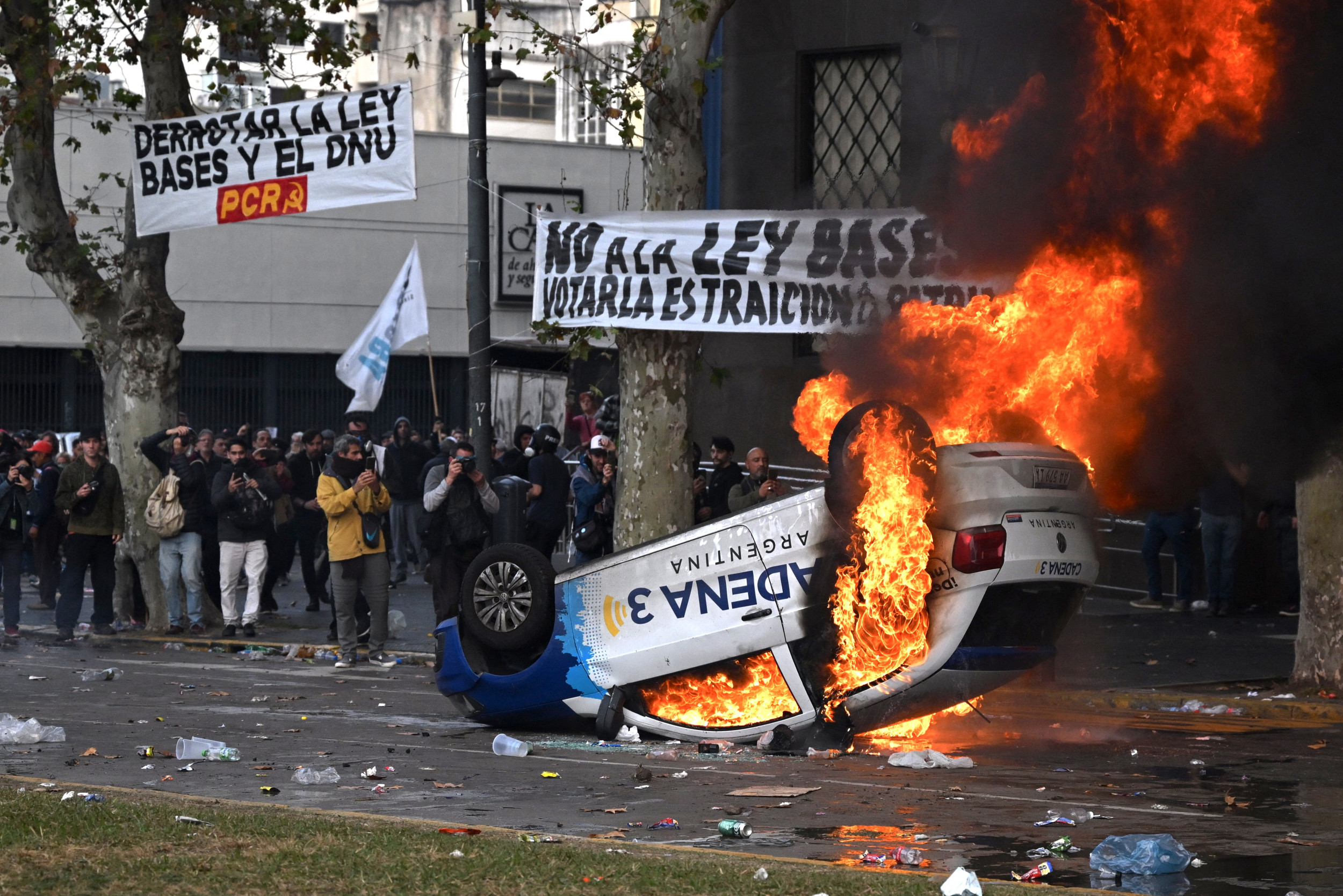Uncommon Knowledge
Newsweek is committed to challenging conventional wisdom and finding connections in the search for common ground.

Riot police clashed with demonstrators in Buenos Aires on June 12, as Argentina‘s Senate narrowly approved the sweeping economic reforms proposed by President Javier Milei.
Water cannons and tear gas were used on protesters, who were opposing austerity measures imposed by Milei. A number of injuries were reported.
Milei is often described as a right-wing libertarian. He has been compared to former U.S. President Donald Trump due to his populist rhetoric and political style, and he has faced intense opposition since he took office in December 2023.
Milei promised radical change to Argentina – a country where 40% of citizens live in poverty – when he was elected. At his inauguration speech, which was attended by a swathe of right-wing politicians including Brazil’s former president Jair Bolsonaro and Hungary’s Prime Minister Viktor Orban, he declared that Argentina faced an “emergency” situation.
His proposals include slashing government spending, privatizing state-owned enterprises and attracting foreign investment through tax incentives.
The Argentinian Senate voted 37 to 36 in favor of his planned reforms. It was a tentative victory for Milei, who has struggled to pass significant legislation due to a fragmented Congress.
Newsweek contacted a representative for Argentina’s Ministry of Economy for comment.
The bill declares a “public emergency in administrative, economic, financial and energy matters for a period of one year.” This will give legislative powers to the executive branch, who will not need the approval of Congress to act, as per a report from CNN.

Protesters gathered around Congress, blasting trumpets, dancing, buying beer and grilling meat from street barbecues. The demonstrators comprised union members, teachers and various social groups who were voicing their opposition to proposed austerity measures.
The protests became violent as riot police clashed with protesters. The police, who were armed with shields and batons, used tear gas and water cannons against the crowd. At least 18 people were arrested, and several others, including five opposition lawmakers, required medical attention after being hit by pepper spray.
A major point of contention is the broad legislative powers granted to Milei, allowing him to implement significant changes without needing further Congressional approval. These powers include control over energy, pensions and security. There are concerns from critics that such measures will undermine democratic processes and concentrate too much power in the executive branch.
Since Javier Milei took office in December, he has closed the Ministry of Women, Genders and Diversity, banned the government’s use of gender-inclusive language and shut the National Institute against Discrimination, Xenophobia and Racism, according to a report from AP.
Milei posted on X, formerly known as Twitter: “Tonight is a triumph for the Argentine people and the first step toward the recovery of our greatness.”
The bill, having passed the Senate, will now undergo a detailed article-by-article review. If any modifications are made, the lower house will need to approve them before the reforms can be fully enacted. This legislative process is expected to continue amid ongoing protests and political tension.

The economic reforms are seen as a litmus test for Milei’s presidency. His administration hopes to secure a new deal with the International Monetary Fund (IMF), to which Argentina owes $44 billion. Investors and international observers are closely watching to see if Milei can build the political consensus needed to sustain his ambitious agenda.
The immediate impact of his policies has been severe, amid spending cuts and a currency devaluation.
Elon Musk has spoken out in support of Milei. In a video shared on X, Musk said: “I think it is very important that Argentina succeeds and that we give President Milei our full support.”
Last month, Business Insider reported that Musk appeared to be “courting” the Argentine president, pointing out that: “Argentina has the world’s second-largest lithium reserves, which are crucial for EV batteries.”
Milei has now left Argentina to travel to the G-7 summit in Italy, where he will meet with the leaders of many of the world’s biggest economies.
Do you have a story we should be covering? Do you have any questions about the unrest in Argentina? ContactLiveNews@newsweek.com
Newsweek is committed to challenging conventional wisdom and finding connections in the search for common ground.
Newsweek is committed to challenging conventional wisdom and finding connections in the search for common ground.